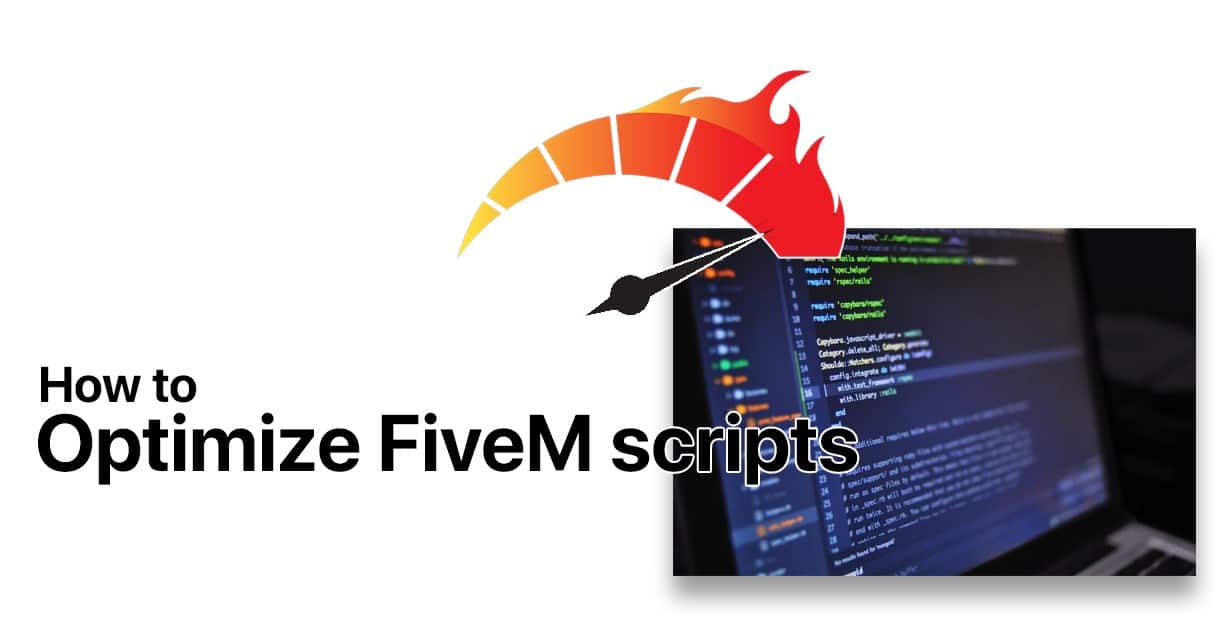FiveM scripts can be immensely rewarding to work with, but when performance issues arise, they can quickly become a nightmare. Many developers find themselves stumped by the “slow resource warning” message and it’s an all too common pitfall that can bog down your server. So, let’s shed some light on how to avoid it, and get your scripts optimized for a smoother gaming experience.
Check out our new AI tool to optimize scripts
Optimize scripts quickly with our new FiveM AI Tool:
Before diving into the optimization process, it’s crucial to understand what the warning message is actually telling us. It provides three critical data points, formatted as follows:
[resource] is taking [time] ms (or -[fps] FPS @ 60 Hz)
[resource]: the resource name that’s running slow, directly correlates to the folder name in your resource/ directory of your server.[time]: the time in milliseconds it took to execute the entire resource. This time is a continuous measurement, averaged over 64 ticks. If the average time of the 64 samples exceeds 5 ms, the warning message pops up.[fps]: the total amount of frames per second (FPS) that is being deducted by running this resource. This is calculated on a 60 FPS basis.
Frequency Optimization
A common problem lies in the frequency at which the code runs. Overly frequent code execution can lead to performance issues. Here are some general rules of thumb:
- Run code only when it needs to be run on every tick. Certain natives containing “ThisFrame” in their name are typical examples.
- Set a reasonable interval for code execution. Not every function needs to check conditions 60 times per second. Consider using longer intervals for less critical checks.
- Segregate any code that does not need to run every frame. Use global variables to influence the code that runs every tick without executing expensive code.
Consider this example where the initial code runs at 119ms and the optimized version at 7ms:
Initial Code 119ms:
Citizen.CreateThread(function()
while(true) do
if IsPedDeadOrDying(PlayerPedId()) then
ShowHudComponentThisFrame(9) -- street name
end
if IsPedInAnyVehicle(PlayerPedId(), true) then
ShowHudComponentThisFrame(6) --vehicle name
end
Citizen.Wait(0)
end
end)
Optimized Code 7ms:
local isDead = false
local inVehicle = false
Citizen.CreateThread(function()
while(true) do
if isDead then
ShowHudComponentThisFrame(9) -- street name
end
if inVehicle then
ShowHudComponentThisFrame(6) --vehicle name
end
Citizen.Wait(0)
end
end)
Citizen.CreateThread(function()
while(true) do
isDead = IsPedDeadOrDying(PlayerPedId())
inVehicle = IsPedInAnyVehicle(PlayerPedId(), true)
Citizen.Wait(500)
end
end)
Optimizing Natives Usage
Natives are at the core of any script, but they can be expensive to call. Especially in a hot code path with multiple natives, execution time can increase significantly. Keep these rules in mind:
- Limit the use of natives in hot code paths and consider alternatives.
- Cache the result of a native instead of calling them repeatedly in the same scope.
Examine the following examples where we progressively optimize the code:
Initial Code:
Citizen.CreateThread(function()
while true do
local armor = GetPedArmour(PlayerPedId())
armor = armor + 1
if armor > 100 then
armor = 0
end
SetPedArmour(PlayerPedId(), armor)
Citizen.Wait(0)
end
end)
Improved Code:
Citizen.CreateThread(function()
local armor = GetPedArmour(PlayerPedId())
while true do
armor = armor + 1
if armor > 100 then
armor = 0
end
SetPedArmour(PlayerPedId(), armor)
Citizen.Wait(0)
end
end)
Further Optimized Code:
Citizen.CreateThread(function()
local player = PlayerPedId()
local armor = GetPedArmour(player)
while true do
armor = armor + 1
if armor > 100 then
armor = 0
end
SetPedArmour(player, armor)
Citizen.Wait(0)
end
end)
However, ask yourself, does the armor value truly need updating every tick? Consider longer intervals for such operations.
A Better Way to Handle Weapon Drops
A common issue arises from scripts handling weapon drops from NPCs. If handled incorrectly, it can result in unnecessary workload for your server. Consider the following optimization:
Initial Code:
local pedindex = {}
function SetWeaponDrops()
local handle, ped = FindFirstPed()
local finished = false
repeat
if not IsEntityDead(ped) then
pedindex[ped] = {}
end
finished, ped = FindNextPed(handle)
until not finished
EndFindPed(handle)
for peds,_ in pairs(pedindex) do
if peds ~= nil then
SetPedDropsWeaponsWhenDead(peds, false)
end
end
end
Citizen.CreateThread(function()
while true do
Citizen.Wait(0)
SetWeaponDrops()
end
end)
Optimized Code:
function SetWeaponDrops()
local handle, ped = FindFirstPed()
local finished = false
repeat
if not IsEntityDead(ped) then
SetPedDropsWeaponsWhenDead(ped, false)
end
finished, ped = FindNextPed(handle)
until not finished
EndFindPed(handle)
end
Citizen.CreateThread(function()
while true do
SetWeaponDrops()
Citizen.Wait(500)
end
end)
In the optimized version, the function SetWeaponDrops() is only called every 500 milliseconds rather than every tick, which significantly improves performance.
FAQ
1. Q: What is FiveM script optimization?
A: FiveM script optimization involves refining your scripts to improve their efficiency and performance. It ensures your resources consume less server power, which can lead to smoother gameplay and can support more players without any significant performance issues.
2. Q: Why is it important to optimize my FiveM scripts?
A: Optimizing your FiveM scripts is vital for maintaining high server performance, reducing lag, preventing server crashes, and improving the overall gaming experience. Optimized scripts use fewer resources, which is crucial when running a server with many active players or complex scripts.
3. Q: I optimized my scripts, but I’m still experiencing performance issues. What could be the problem?
A: There could be several reasons for this. It’s possible that not all scripts are fully optimized, or there might be conflicts between different scripts. Your server hardware could also be a limiting factor. Please let me know your exact issue for a more accurate diagnosis.
4. Q: What is the function of Citizen.CreateThread in my script?
A: Citizen.CreateThread is a function used to create a new continuous thread in a script. This means that whatever code you place inside this function will run in an infinite loop, making it ideal for repeatedly executing specific code blocks.
5. Q: What is the role of the Citizen.Wait function?
A: Citizen.Wait is a function that halts the execution of the current thread for a specified amount of time. This is useful in managing server performance by preventing the immediate execution of resource-intensive operations.
6. Q: I’ve seen scripts that use Citizen.Wait(0). Is this bad for performance?
A: Using Citizen.Wait(0) means that the script pauses for the smallest possible time frame, essentially leading to no real pause. This can cause performance issues if the code inside the thread is heavy or complex, as it’s being executed every server frame. It’s usually better to use a higher wait time if possible.
7. Q: Why is the first example in the tutorial less efficient than the second one?
A: The first example inefficiently iterates over all the peds twice – first to store them in a table, and then to apply the SetPedDropsWeaponsWhenDead function. The second example is more efficient because it applies SetPedDropsWeaponsWhenDead as soon as a ped is found, eliminating the need for storing peds and iterating over them twice.
8. Q: What should I do if I’m unsure about optimizing my scripts?
A: It’s always best to seek professional help if you’re unsure. Badly optimized scripts can cause many problems, from poor server performance to crashes. There are many resources available online, such as forums and tutorials, and many professionals who can help.
Conclusion
Optimizing your FiveM scripts involves a clear understanding of your code, insight into how often it’s running, and clever use of available resources. Implement these strategies, and you’re sure to see a considerable improvement in your server’s performance.
Remember, it’s a continuous process, and you might not always get it right the first time. If you continue to experience performance issues, don’t hesitate to reach out for assistance. Happy optimizing!






